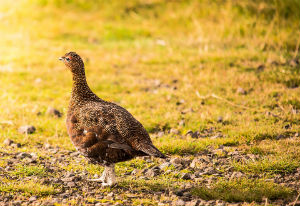Thousands of English plant and animal species could be displaced by climate change
Release Date 24 July 2017

The populations and distributions of three quarters of 3,000 plant and animal species in England are likely to be significantly affected by climate change by the end of the century, new research has found.
A newly-published paper in the journal Biological Conservation, involving research carried out at the University of Reading, assesses the impact of climate change on the distribution of over 3,000 British plants and animals across 17 taxonomic groups.
If the average global temperature increases by 2°C by the 2080s, the scientists predict more than a quarter (27%) of species would be at high to medium risk of losing a substantial proportion of their currently suitable ranges. They also predict more than half (54%) could significantly expand to other areas.
The most vulnerable were northern and upland species, including birds like the Dotterel and Red Grouse, flowering plants such as crowberry, and damp loving mosses and liverworts.
Conversely, wasps, bees, ants and many southerly distributed species such as Dartford Warbler and emperor dragonfly were thought likely to thrive in response to warmer temperatures and would be able to colonise new areas assuming suitable habitats are available.
“Whilst a watching brief may be okay for some species, to ensure the protection of others we will need to step up conservation efforts" - Dr Tom Oliver, University of Reading
The report emphasises the need for conservation action to increase our wildlife’s ability to survive climate change.
Dr Tom Oliver, Associate Professor of Ecology and Evolutionary Biology at the University of Reading and co-author, said: “Whilst a watching brief may be okay for some species, to ensure the protection of others we will need to step up conservation efforts to ensure that there is sufficient good quality habitat, which will help species to cope with climate change impacts.”
A more detailed study of 400 species included information on population trends, and took into account other factors known to make species more vulnerable to climate change, such as restriction to small, localised populations. This more comprehensive assessment found that taking into account these other factors slightly increased the proportion of wildlife at risk from climate change (35%), with 42% likely to have opportunities to expand.
The researchers say potential beneficiaries of climate change will not be able to expand their range if they lack areas of suitable habitats to move into. They are calling for action to protect and enhance networks of semi-natural habitats for species to colonise, and say direct management may help otherwise threatened species to adapt to a warmer climate.
The study was led by the British Trust for Ornithology (BTO) and funded by Natural England. It also involved the University of York, the Biological Records Centre at the Centre for Ecology and Hydrology, Royal Society for the Protection of Birds (RSPB), Butterfly Conservation and Botanical Society of Britain and Ireland (BSBI).
'An opportunity for all of us to get involved'
Dr James Pearce-Higgins, Director of Science at the BTO and lead author of the study said, “This is arguably the most wide-ranging assessment of climate change impacts on species so far published in the scientific literature, and provides valuable information for nature conservationists, who need to plan for changing species’ distributions and an uncertain future.
“There is an opportunity for all of us to get involved to reduce this uncertainty, by contributing to biological monitoring and recording schemes run by organisations like the BTO, Biological Records Centre and Botanical Society of Britain and Ireland (BSBI). This will enable us to better track changes to the natural world as they occur, and improve our assessments of the future.”
Dr. Mike Morecroft, Principal Specialist in Climate Change at Natural England, the government conservation body who funded the project and another author of the paper said: "Climate change is a big challenge to conservationists : we need to be ready to protect species where they have the best chance in the future, which will not always be the same places as in the past. Good science is more important than ever to ensure good decision making."
Dr Colin Beale from the University of York and co-author said: “This new research suggests climate change may result in widespread changes in the conservation status of many of England's plants and animals. In England we're likely to see more winners than losers if we manage land in the right places to facilitate expanding populations, and this research will also help us identify where we have the best chance to help species expected to do poorly without appropriate actions.”
Dr Richard Bradbury, Head of Environmental Research at the RSPB Centre for Conservation Science and author on the paper, said: “There is a growing volume of evidence that climate change is already having an impact on nature in the UK. This presents both risks and opportunities, highlighted by this new paper. We can help some species to expand their ranges into England, as their traditional homes elsewhere in Europe become less suitable. For some of our much-loved species, it’s now more important than ever that we’re prepared for this new risk, to ensure that they don’t end up disappearing from our shores altogether. We must grasp the opportunity to both strengthen our network of protected areas and to manage our wider landscapes more sympathetically so that nature can thrive.”
Full reference:
J. Pearce-Higgins, Colin M. Beale, T. Oliver, T. August, M. Carroll, D. Massimino, N. Ockendon, J. Savage, C. Wheatley, M. Ausden, R. Bradbury, S. Duffield, N. Macgregor, C. McClean, M. Morecroft, C. Thomas, O. Watts, B. Beckmann, R. Fox, H. Roy, P. Sutton, K. Walker, H. Crick (2017). 'A national-scale assessment of climate change impacts on species: Assessing the balance of risks and opportunities for multiple taxa.’Biological Conservation. Doi: 10.1016/j.biocon.2017.06.035